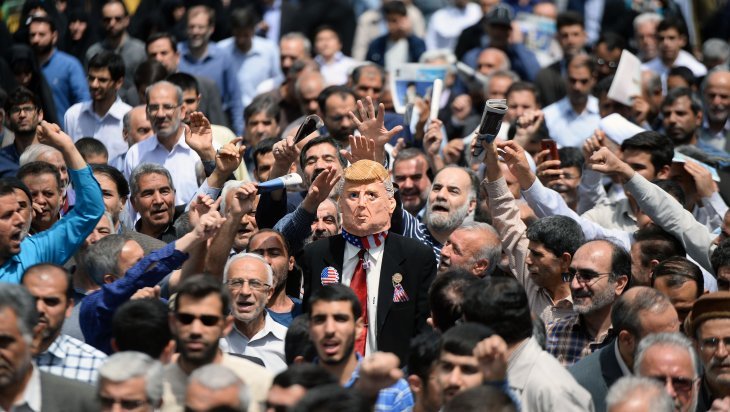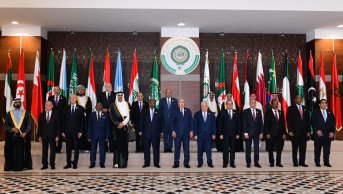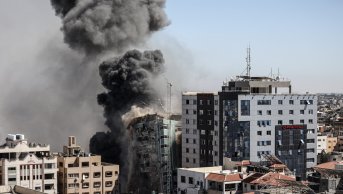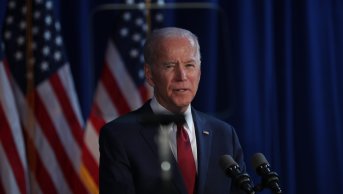The Iran-US Showdown: Going Where?

In the last month, the United States has for the first time declared an institution of another state, the Islamic Revolutionary Guard Corps (IRGC) of Iran, a terrorist organization. Michael Pompeo, US Secretary of State, explained the purpose of this move as “applying maximum pressure in order to sever Iran’s support to terrorist and destabilizing activities in the Middle East”. It seems that the Trump administration did not consider the warning by the US Secretary of Defense that Iran might retaliate against the US soldiers in Syria and Iraq. However, when Iran did not react after the Iraqi group Haraqat al-Nujaba was declared terrorist, the hawkish opinion in the US administration seemed to have gained the upper hand. In reality, the US has treated the Islamic Republic of Iran entirely as a terrorist state since the Iranian revolution. Now that it has been officially declared, there will be legal, political and economic consequences.
In general, the decision fits within Trump’s strategy of containing Iran, yet it was also aimed to support Netanyahu in the Israeli elections just like the Golan decision, since it was declared in the day before the elections. Trump has done what he has promised about Iran. First, he pulled out of the Nuclear Deal. Then he inflicted new sanctions. In May, he intensified the sanctions and canceled the waivers that he used to offer some states such as Turkey. Now, he seeks to make Iran surrender without fighting.
There will be grave consequences of the designation of the IRGC as a terrorist organization by the US. It will impact a wide spectrum in an economic sense since it imposes a ban on foreign companies that work with the IRGC in the United Arab Emirates, Iraq, Lebanon and even Europe and Asia. American companies will not work with these companies and the individuals affiliated with these will not be allowed to enter the United States and those who breach the ban will be tried. For the reason that no state or institution is granted a waiver, the contacts of US diplomats or military with some groups or companies in Lebanon and Iraq might be severed.
The foreign companies who invest in and engage in business with Iran will be directly affected by this decision. That is because, almost half of the Iranian economy is related with the IRGC and the decision involves almost all economic activity. This decision coupled with the new sanctions in May has signed the death warrant for the Iranian economy. The situation will make Iran surrender and accept new conditions for the nuclear deal known as the JCPOA. However, Iran cannot accept this deal for it will be against its own existence. Iran cannot stand intact when its economy has been destroyed.
Iran cannot directly target the US yet it will make some moves that will serve to keep the morale of its supporters strong. Iran may threaten the US with harming its allies in the Gulf and destabilizing Iraq or it can harass the US military presence in the Gulf. Yet, Iran cannot undertake a comprehensive military assault that might hurt the US since it will be a suicidal move. It is too risky for Iran to test the limits and nerves of Trump, who is difficult to predict and prone to act recklessly. Yet, the economic sanctions are killing Iran slowly.
The external branches and operations of the Revolutionary Guards will be majorly affected by economic and political sanctions. For example, the Lebanese Hezbollah and the Fatimiyyun brigade in Syria are affected by general economic sanctions as well as the sanctions of the IRGC. However, these groups are likely to target the US or its allies. For example, Hezbollah might target Israel or the Houthis of Yemen might target Saudi Arabia or the United Arab Emirates.
In this framework, Iran might provoke Saudi Arabia even further by having its proxies in Yemen launch missiles at and even invade the Saudi territory or inciting the Shiites in Qatif to revolt. Similarly, it might provoke the Shiites in Bahrain to rise up. These moves will not change the equation on the table, however, they would encourage Iran and its followers with greater morale. Furthermore, such moves would make Saudi Arabia move even closer to the United States and join the conflict. In addition to this, the US would favor the low probability of Saudi Arabia to enter into direct confrontation with Iran. Saudi’s armed confrontation with Iran, like the case in Yemen, would not hurt the US and the US might even prefer that.
Otherwise, Iran might dare to confront the US in Iraq through its proxies because it is ironically a low-cost tactic. That is because Iran will lose its corridor to Iraq and Lebanon if it is blocked in Iraq. Iran would not dare to do that and would opt for escalation in Iraq. A confrontation in Iraq would be of limited cost to Iran, who prefers to fight outside its borders. The Iraqi Hashd al Shaabi receives payments from the Iraqi government, thus their attacks against the US will have limited costs for Iran.
Ayatollah Khamanei demanded from Adel Abdulmehdi, then Prime Minister of Iraq during his visit to Iran that the US forces to be sent away from Iraq. However, Abdulmehdi’s statements did not include this demand. The reason might be that the Iraqi government does not want to take sides. Yet, it would be obliged to take sides if the situation gets worse. Iraqi Sunnis, Kurds and non-sectarian Shiites would choose the US if they have to. Even Muqtada al Sadr, who is known for his anti-Americanism, stated that he would not take sides in any Iran-US confrontation.
Even if the Iranian government seeks to hold negotiations (despite stating just the opposite), Trump does not favor a consensus. That is because time favors Trump and is against Iran who is bleeding. Therefore, Iran needs to act swiftly and has already undertaken some maneuvers. For example, Iran stated that it will withdraw from the nuclear treaty and sought to make the European Union states pressure Trump. Yet this did not work. Later on, the attacks against the oil tankers in the territorial waters of the United Arab Emirates show that Iran seeks to harass the US allies. At the same time, the Houthis of Yemen launched drone strikes against the oil facilities near the capital city of Saudi Arabia albeit with limited impact.
During these developments, John Bolton, former National Security Advisor of the Trump administration, verified that the US sends a carrier and an air wing to the region, yet denied that they send 120,000 soldiers. Similarly, Bolton denied the news that the Trump administration is holding talks with Iran. Both Iran and US state that they do not want war and in such a case they would seriously cause harm to the adversary. However, the probability of an armed confrontation, whether direct or indirect, is more than one percent. A small accident or provocation might cause the crisis to spiral out of control.
Amidst the threats, the US has demanded its citizens, except the ones on important official duties, leave Iraq. A missile attack conducted the day before, on the Baghdad Green Zone near the US Embassy shows that tensions will escalate. After the attack, Trump tweeted, “If Iran wants to fight, that will be the official end of Iran. Never threaten the United States again!” Iranian Foreign Minister Javad Zarif responded by reminding that invaders have failed to make Iran bow down. Donald Trump has posted another tweet saying, “Iran will call us if and when they are ever ready. In the meantime, their economy continues to collapse - very sad for the Iranian people!”
It is known that, while Trump does not want an armed confrontation with Iran, his hawkish aides (particularly Pompeo and Bolton) do. It shows that the main aim of the US in Iran is regime change. War is a low probability for the US due to high costs. Even without war, the US is gradually making Iran kneel because its economy is worsening and time runs against Iran. On the other hand, even if the Iranian regime loses the popular support it enjoys, ideological fanatics and affiliated interest groups continue supporting the regime. Iran might make moves that will shock the world economy (over oil) because its peaceful instruments are not working.
The worst-case scenario related to Iran’s counter moves against the US is shutting down the Strait of Hormuz. Located within the range of Iranian artillery, the Strait of Hormuz is very important for world oil and the gas trade. As it has the potential to shatter the world economy, shutting down the Strait is the most difficult, the most dangerous, and the riskiest option for Iran. It would be a desperate measure for Iran amounting to a suicidal attack. If the Strait of Hormuz is shut down, oil prices will go up and the world countries will have reactions to both Trump and Iran. Trump’s usual approach indicates that he will not care about any reactions. Nevertheless, skyrocketing oil prices might negatively affect the 2020 elections, which might force Trump to pay attention to such a move.
The Iran-US tensions will have critical implications for Turkey as well. For example, it would not be realistic to expect that Iran will degrade its relations with the PKK during this period. That is because facing economic pressure, Iran will support smuggling activities by the PKK along the Iraqi border. The PKK transports illicit drugs to Iraq and brings back alcohol etc. to Iran. Such a large-scale smuggling activity will continue receiving endorsement in Iran. Another important point for Turkey is that the IRGC will lose its influence in Iraq and Syria due to the embargoes. Therefore, Iran will be more open to cooperation with Turkey in Syria. For example, the Iran-backed militias do not participate in the Assad regime’s assaults in Idlib. In Iraq, the Hashd al Shaabi groups will lose influence due to their IRGC affiliation. Therefore, the Iranian pressure on the Iraqi government, Sunnis and Turkmens might decrease.
In conclusion, Iran is vulnerable to the US sanctions. The IRGC control over half of the Iranian economy will put a strain on the foreign (particularly Chinese) companies who wish to do business in Iran. The decision to put sanctions amounts to a death warrant and, coupled with the new sanctions in May 2019, will impact groups and sub-branches such as Hezbollah and Fatimiyyun Brigade and their activity. Iran may seek negotiations with the United States, yet Trump is unwilling and the US demands and conditions amount to the self-negation of the regime. Thus, negotiations are almost impossible. As the tensions mount, neither the EU, nor Russia and China can resist the US regarding the Iranian issue.










